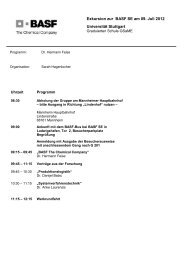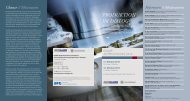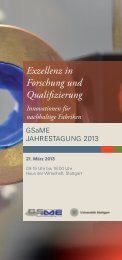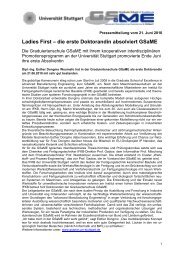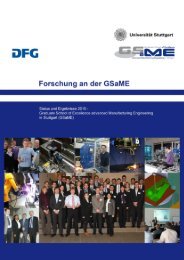Forschung an der GSaME - Status und Ergebnisse 2012
Forschung an der GSaME - Status und Ergebnisse 2012
Forschung an der GSaME - Status und Ergebnisse 2012
- Keine Tags gefunden...
Sie wollen auch ein ePaper? Erhöhen Sie die Reichweite Ihrer Titel.
YUMPU macht aus Druck-PDFs automatisch weboptimierte ePaper, die Google liebt.
However, our initial approach was restricted to basic types of errors based on raw RFID events,namely, single readings <strong>an</strong>d product part sequences. In the year <strong>2012</strong>, we focused on theautomatic <strong>an</strong>d reliable online detection of complex m<strong>an</strong>ufacturing events that describe morecomplex <strong>an</strong>d me<strong>an</strong>ingful m<strong>an</strong>ufacturing errors. In detail, we consi<strong>der</strong>ed the following complexerror types: (1) Delays in the production of certain product parts. (2) Sequence errors. (3)Synchronization errors, where product parts on different production lines move along the linesin the wrong (unsynchronized) or<strong>der</strong>, which would lead to assembly errors at assembly pointswhere these parts meet. (4) Missing product parts. (5) Incorrect positioning of parts on h<strong>an</strong>dlingdevices.As main contributions, we first proposed <strong>an</strong> extension to our consistency stack (a conceptualmodel for describing different kinds of RFID errors <strong>an</strong>d their relation). Secondly, we proposedprobabilistic models <strong>an</strong>d algorithms for detecting the complex m<strong>an</strong>ufacturing errors introducedabove. Thirdly, we showed the effectiveness of our approach w.r.t. increased reliability usingreal world experiments with a prototype in a smart factory environment.ThemaE5: Integriertes Real-Time Business Prozess M<strong>an</strong>agement fürProduktion <strong>und</strong> LogistikDoktor<strong>an</strong>d:Dipl.-Wirtsch.-Ing. Philip HollsteinThesis Committee: Prof. Dr. H<strong>an</strong>s-Georg Kemper (BWI - Abt. VII)Prof. Dr.-Ing. habil. Bernhard Mitsch<strong>an</strong>g (IPVS)Projektbeginn: 01.08.2009E-Mail:philip.hollstein@gsame.uni-stuttgart.deZusammenfassungDer Erfolgsfaktor „W<strong>an</strong>dlungsfähigkeit“ gewinnt aufgr<strong>und</strong> kürzer werden<strong>der</strong>Produktlebenszyklen für produzierende Unternehmen immer mehr <strong>an</strong> Bedeutung. DieW<strong>an</strong>dlungsfähigkeit ist determiniert durch die W<strong>an</strong>delbarkeit technischer Infrastrukturen <strong>und</strong>die Flexibilität von Produktionsprozessen. Damit sie ökonomisch sinnvoll genutzt werden k<strong>an</strong>n,müssen zusätzlich betriebswirtschaftliche Größen berücksichtigt werden. Daher kommt <strong>der</strong>Informationsversorgung von Entscheidungsträgern eine wichtige Rolle zu.Das Ziel des <strong>Forschung</strong>sprojekts ist die Erstellung <strong>und</strong> Validierung eines Konzepts zuradäquaten Entscheidungsunterstützung für das Produktionsm<strong>an</strong>agement im Kontext <strong>der</strong>W<strong>an</strong>dlungsfähigkeit unter Berücksichtigung dieser drei Aspekte.Das Konzept basiert auf einem maschinenorientierten Data Warehouse (mDWH), mithilfedessen feingr<strong>an</strong>ulare <strong>und</strong> zeitnahe, nichtmonetäre Maschinendaten mit zeitraumbezogenen,monetären Produktionsdaten zusammengeführt werden. Das Konzept des mDWH wirdprototypisch umgesetzt <strong>und</strong> <strong>an</strong>h<strong>an</strong>d eines Use-Case aus dem Maschinenbau empirischvalidiert.73





